President Richard Nixon addressed the issue of crime control in his 1973 State of the Union address, saying: "Americans in the last decade were often told that the criminal was not responsible for his crimes against society, but that society was responsible. I totally disagree with this permissive philosophy. Society is guilty of crime only when we fail to bring the criminal to justice."
Thirty years later, 2003 Gallup Polls in the United States, Great Britain, and Canada* find that the British people most closely align with Nixon on this issue, as close to half of British adults favor tougher law enforcement as the best remedy for crime. Americans and Canadians are much more likely to favor dealing with crime by addressing the root causes.
Gallup asked respondents which approach they think is best for reducing crime: committing more resources toward "attacking the social and economic problems that lead to crime through better education and job training," or "deterring crime by improving law enforcement with more prisons, police, and judges." In the United States and Canada, roughly two-thirds said they would increase resources for attacking the social and economic problems that lead to crime (69% of Americans, 65% of Canadians); less than a third opted for a harder line on deterrence (29% of Americans, 32% of Canadians). But in Great Britain, only 51% chose the social problems route; nearly as many (46%) favored greater spending on prisons, police, and judges.
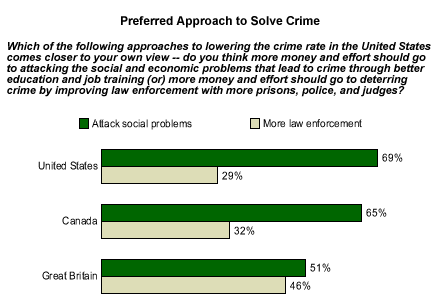
Why the difference between Great Britain and her North American cousins? After all, research conducted in all three countries shows that crime rates have been declining sharply over the last several years. But despite the falling crime rate in Britain, a 2001 U.N. report on crime victimization in 17 industrialized countries gave Britain (not including Scotland) something of a black eye. It showed that after Australia, England/Wales has the highest crime rate of any country in its study.
With regard to crime prevalence (the percentage of people victimized one or more times within a year), England/Wales ranks second, with 26% of the residents experiencing crime in 1999. Canada ranks 5th, with 24%, and the United States ranks 11th, with 21%. This information was reported to the British people by one leading newspaper under the headline, "England Has Worst Crime Rate in World."
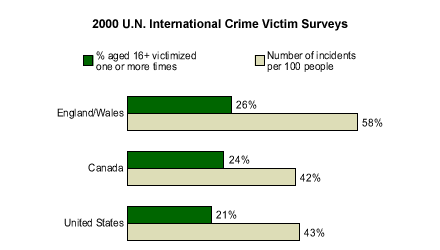
Given such publicity about the British crime problem, it is perhaps understandable that the British people are dour on the issue. Gallup polling shows that residents of all three countries persist in believing that crime in their respective nation is getting worse, but this perspective is particularly widespread in Great Britain. Nearly three-quarters of Britons told Gallup there is more crime in Great Britain than there was a year ago, versus 63% in Canada and 60% in the United States.
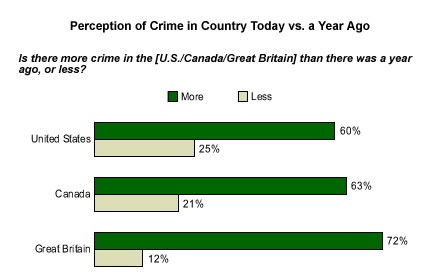
The British are also more likely to fear becoming crime victims. Close to half (46%) of British respondents say there is an area within a mile of their homes where they would be afraid to walk alone at night. Only 36% of Americans and 32% of Canadians express this fear.
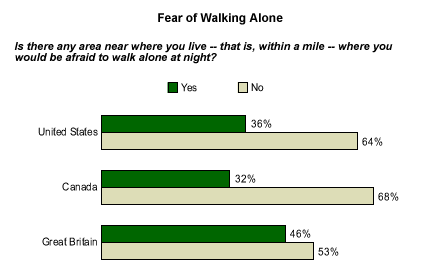
Echoing the relatively widespread desire for greater law enforcement, the majority of Britons (83%) say that the criminal justice system in their country is not tough enough in its handling of crime. This compares with 79% of Canadians and 65% of Americans who feel this way.
Perhaps most damning for the British criminal justice system is that a majority of Britons lack confidence in the police to protect them from violent crime. Only 39% have "a great deal" or "quite a lot" of confidence in the police; 58% have "not very much" or "none at all." Sixty percent of Americans have a great deal or quite a lot of confidence, as do 64% of Canadians.
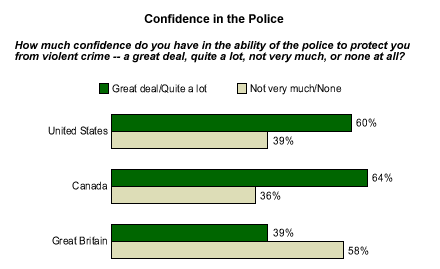
Bottom Line
In August 1999, a 55-year-old farmer in a rural section of eastern England shot and killed a 16-year-old burglar at his home and injured his 30-year-old accomplice. The farmer was originally convicted of murder and received a mandatory life sentence, setting off an explosive debate in Great Britain over the nation's crime problem and the people's right to self-defense. British polls showed that the public widely backed the farmer's actions, and his sentence was eventually changed to manslaughter. But the fire for reform of the criminal justice system was lit.
Today, the British Labour and Conservative parties are jockeying for position as the better party for handling crime: the Conservatives with a traditional "tough on crime" approach; and Labour trying to be as tough as possible while also advocating for social cures. It harkens back to American politics of the 1960s. But as Gallup polling shows, this is a real problem for the British people today, and one they are hoping to see resolved with tougher law enforcement.
*Results in the United States are based on telephone interviews with 1,017 national adults, aged 18 and older, conducted Oct. 6-8, 2003; For results based on the total sample of national adults, one can say with 95% confidence that the maximum margin of sampling error is ±3 percentage points. The survey was conducted by Gallup USA.
Results in Canada are based telephone interviews with 1,012 national adults, aged 18 and older, conducted Dec. 5-11, 2003. For results based on the total sample of national adults, one can say with 95% confidence that the maximum margin of sampling error is ±3 percentage points. The survey was conducted by Gallup Canada.
Results in Great Britain are based telephone interviews with 1,000 national adults, aged 18 and older, conducted Dec. 2-21, 2003. For results based on the total sample of national adults, one can say with 95% confidence that the maximum margin of sampling error is ±5 percentage points. The survey was conducted by Gallup UK.
